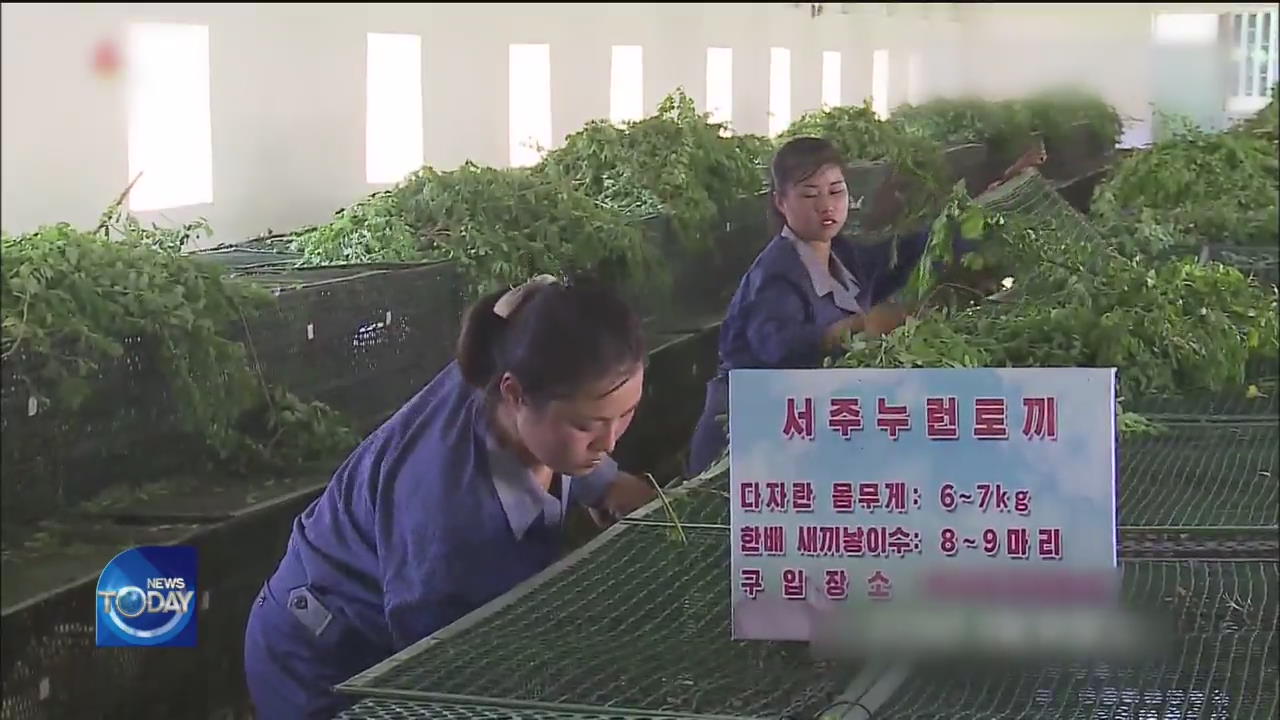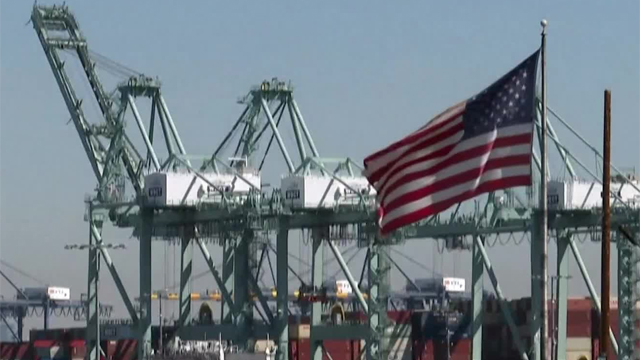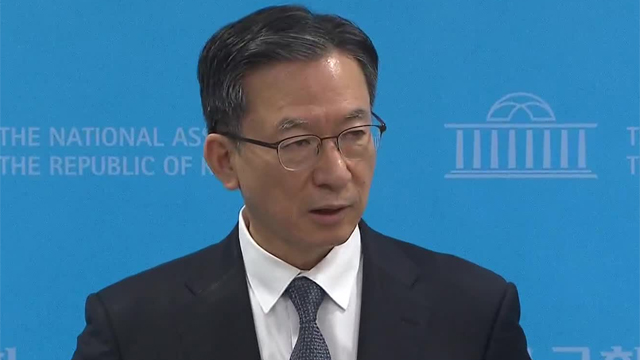N. KOREA FACE ECONOMIC HARDSHIP AMID COVID-19
입력 2020.07.06 (15:09)
수정 2020.07.06 (16:46)
읽어주기 기능은 크롬기반의
브라우저에서만 사용하실 수 있습니다.
[Anchor Lead]
North Korea is reportedly experiencing serious economic difficulties because of the COVID-19 pandemic and economic sanctions. Here's more.
[Pkg]
This North Korean TV show is titled "Changing Grass into Meat." It calls on the public to increase meat production by feeding grass to livestock animals such as rabbits, goats and sheep.
[Soundbite] "We can solve meat shortages by raising more rabbits."
Political slogans that were used in the past to overcome serious malnutrition in the country have appeared recently again. The U.S. Department of Agriculture estimates North Korea's rice production at just under 1.4 million tons this year, less than a fourth of the annual amount needed by the North's population, which consumes more than 5.5 million tons of rice a year. Observers say a decrease in fertilizer imports due to the coronavirus pandemic is to blame for the dwindling rice production.
[Soundbite] KIM YOUNG-HOON(KOREA RURAL ECONOMIC INSTITUTE) : "North Korea imports 60 percent of chemical fertilizer. A decrease in fertilizer supply means a gloomy forecast for its agricultural production this year."
The International Trade Center says North Korea imported 7.4 million dollars worth of grains from Russia back in April. That's close to the total amount of imports of the past five years. Sources say the number of North Korean freight ships loading wheat and noodles, two unsanctioned items, has surged in recent days at the Russian port of Vladivostok. Analysts also ascribe the economic hardships in the North to hampered exports to China due to the pandemic.
[Soundbite] KO YOUNG-HWAN(FORMER VICE HEAD OF INSTITUTE FOR NATIONAL SECURITY STRATEGY) : "North Korea used to earn 6 billion dollars from China, but this year, in February and March, its exports to China recorded only 10 million or 20 million dollars."
Global credit rating agency Fitch Ratings predicts the North Korean economy to contract 6 percent this year. That's 10 percentage points lower than the 3.7 percent forecast made early this year. Analysts say the North's economic self-reliance has hit the wall.
North Korea is reportedly experiencing serious economic difficulties because of the COVID-19 pandemic and economic sanctions. Here's more.
[Pkg]
This North Korean TV show is titled "Changing Grass into Meat." It calls on the public to increase meat production by feeding grass to livestock animals such as rabbits, goats and sheep.
[Soundbite] "We can solve meat shortages by raising more rabbits."
Political slogans that were used in the past to overcome serious malnutrition in the country have appeared recently again. The U.S. Department of Agriculture estimates North Korea's rice production at just under 1.4 million tons this year, less than a fourth of the annual amount needed by the North's population, which consumes more than 5.5 million tons of rice a year. Observers say a decrease in fertilizer imports due to the coronavirus pandemic is to blame for the dwindling rice production.
[Soundbite] KIM YOUNG-HOON(KOREA RURAL ECONOMIC INSTITUTE) : "North Korea imports 60 percent of chemical fertilizer. A decrease in fertilizer supply means a gloomy forecast for its agricultural production this year."
The International Trade Center says North Korea imported 7.4 million dollars worth of grains from Russia back in April. That's close to the total amount of imports of the past five years. Sources say the number of North Korean freight ships loading wheat and noodles, two unsanctioned items, has surged in recent days at the Russian port of Vladivostok. Analysts also ascribe the economic hardships in the North to hampered exports to China due to the pandemic.
[Soundbite] KO YOUNG-HWAN(FORMER VICE HEAD OF INSTITUTE FOR NATIONAL SECURITY STRATEGY) : "North Korea used to earn 6 billion dollars from China, but this year, in February and March, its exports to China recorded only 10 million or 20 million dollars."
Global credit rating agency Fitch Ratings predicts the North Korean economy to contract 6 percent this year. That's 10 percentage points lower than the 3.7 percent forecast made early this year. Analysts say the North's economic self-reliance has hit the wall.
■ 제보하기
▷ 카카오톡 : 'KBS제보' 검색, 채널 추가
▷ 전화 : 02-781-1234, 4444
▷ 이메일 : kbs1234@kbs.co.kr
▷ 유튜브, 네이버, 카카오에서도 KBS뉴스를 구독해주세요!
- N. KOREA FACE ECONOMIC HARDSHIP AMID COVID-19
-
- 입력 2020-07-06 15:14:08
- 수정2020-07-06 16:46:27

[Anchor Lead]
North Korea is reportedly experiencing serious economic difficulties because of the COVID-19 pandemic and economic sanctions. Here's more.
[Pkg]
This North Korean TV show is titled "Changing Grass into Meat." It calls on the public to increase meat production by feeding grass to livestock animals such as rabbits, goats and sheep.
[Soundbite] "We can solve meat shortages by raising more rabbits."
Political slogans that were used in the past to overcome serious malnutrition in the country have appeared recently again. The U.S. Department of Agriculture estimates North Korea's rice production at just under 1.4 million tons this year, less than a fourth of the annual amount needed by the North's population, which consumes more than 5.5 million tons of rice a year. Observers say a decrease in fertilizer imports due to the coronavirus pandemic is to blame for the dwindling rice production.
[Soundbite] KIM YOUNG-HOON(KOREA RURAL ECONOMIC INSTITUTE) : "North Korea imports 60 percent of chemical fertilizer. A decrease in fertilizer supply means a gloomy forecast for its agricultural production this year."
The International Trade Center says North Korea imported 7.4 million dollars worth of grains from Russia back in April. That's close to the total amount of imports of the past five years. Sources say the number of North Korean freight ships loading wheat and noodles, two unsanctioned items, has surged in recent days at the Russian port of Vladivostok. Analysts also ascribe the economic hardships in the North to hampered exports to China due to the pandemic.
[Soundbite] KO YOUNG-HWAN(FORMER VICE HEAD OF INSTITUTE FOR NATIONAL SECURITY STRATEGY) : "North Korea used to earn 6 billion dollars from China, but this year, in February and March, its exports to China recorded only 10 million or 20 million dollars."
Global credit rating agency Fitch Ratings predicts the North Korean economy to contract 6 percent this year. That's 10 percentage points lower than the 3.7 percent forecast made early this year. Analysts say the North's economic self-reliance has hit the wall.
North Korea is reportedly experiencing serious economic difficulties because of the COVID-19 pandemic and economic sanctions. Here's more.
[Pkg]
This North Korean TV show is titled "Changing Grass into Meat." It calls on the public to increase meat production by feeding grass to livestock animals such as rabbits, goats and sheep.
[Soundbite] "We can solve meat shortages by raising more rabbits."
Political slogans that were used in the past to overcome serious malnutrition in the country have appeared recently again. The U.S. Department of Agriculture estimates North Korea's rice production at just under 1.4 million tons this year, less than a fourth of the annual amount needed by the North's population, which consumes more than 5.5 million tons of rice a year. Observers say a decrease in fertilizer imports due to the coronavirus pandemic is to blame for the dwindling rice production.
[Soundbite] KIM YOUNG-HOON(KOREA RURAL ECONOMIC INSTITUTE) : "North Korea imports 60 percent of chemical fertilizer. A decrease in fertilizer supply means a gloomy forecast for its agricultural production this year."
The International Trade Center says North Korea imported 7.4 million dollars worth of grains from Russia back in April. That's close to the total amount of imports of the past five years. Sources say the number of North Korean freight ships loading wheat and noodles, two unsanctioned items, has surged in recent days at the Russian port of Vladivostok. Analysts also ascribe the economic hardships in the North to hampered exports to China due to the pandemic.
[Soundbite] KO YOUNG-HWAN(FORMER VICE HEAD OF INSTITUTE FOR NATIONAL SECURITY STRATEGY) : "North Korea used to earn 6 billion dollars from China, but this year, in February and March, its exports to China recorded only 10 million or 20 million dollars."
Global credit rating agency Fitch Ratings predicts the North Korean economy to contract 6 percent this year. That's 10 percentage points lower than the 3.7 percent forecast made early this year. Analysts say the North's economic self-reliance has hit the wall.
이 기사가 좋으셨다면
-
좋아요
0
-
응원해요
0
-
후속 원해요
0

















이 기사에 대한 의견을 남겨주세요.